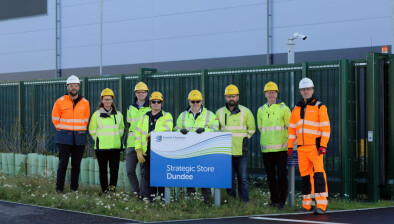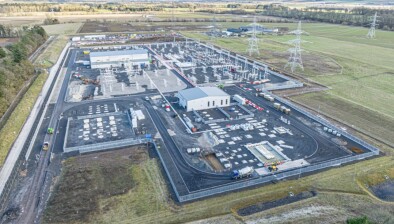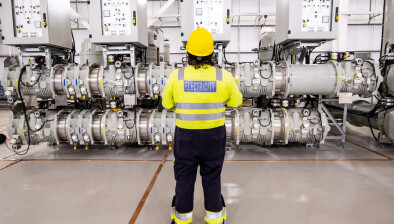Consortium eyes-up £5m bid for game-changing energy innovation

A public/ private consortium made up of Advanced Infrastructure, Oxfordshire County Council, Dundee City Council, Perth & Kinross Council as well as Scottish and Southern Electricity Networks (SSEN) have announced their successful bid in the Innovate UK Net Zero Living programme.
The aim of the Net Zero Living programme is to support up to 31 cities to develop a plan to accelerate their transition to net zero. This will be achieved by developing innovative digital solutions to overcome non-technical barriers to implementation.
By 2050, cities and local governments will influence over 80% of net zero carbon emissions targets, however in order to reach these targets the UK needs to deploy £40 billion/year of low carbon infrastructure. The current investment into low carbon infrastructure is only £4bn/year due to a stalled project pipeline.
Digital twins supporting data-driven decision making tools could reduce capital costs by 7% and put cities on target to reach their climate targets.
The output of the project will be spatial intelligence tools for the energy transition. The software service will help public and private organisations plan and optimise their infrastructure for a net zero future.
The consortium led by Advanced Infrastructure represents a broad industrial & governmental coalition with the ability to influence regional decision-making as well as provides an opportunity to create a lower cost digital solution to whole systems energy planning that helps overcome non-technical barriers and is applicable to multiple local government structures.
The proposed innovation will accelerate the development and delivery of local area energy plans and statutory Local Heat and Energy Efficiency Strategy (LHEES) in Scotland and local energy projects by developing datasets and software solutions to overcome systemic barriers such as finance, capability, coordination of grid reinforcement, and system governance.
Engineering consultants are often engaged by cities to fill capability-gaps but are unsustainably expensive for tasks such as stakeholder engagement and data gathering. Advanced Infrastructure’s national-scale digital twin of the energy system reduces these costs and automates complex workflows. The digital twin reduces the skill-level required to perform complex tasks such as optioneering/zoning, low carbon technology siting, and new energy network connection requests.
The software solution enables planners to make data-driven decisions previously only possible with advanced tools and training. The tool models the deployment of low carbon technology building-blocks and is compatible with OfGem DFES (Distribution Future Energy Scenarios) modelling. The combination of high resolution demographic data and network modelling will be a first-of-a-kind deployment in the UK.
Interviews conducted by Advanced Infrastructure with over 100 local authority officers have identified that currently one third of energy projects are cancelled after the feasibility studies stage due to grid constraints. This lack of data and knowledge of low carbon technology potential at building-level costs authorities an average of £10,000 per project in avoidable costs.
Difficulty collaborating across organisational boundaries and accessing finance were also identified as major blockers. These non-technical barriers were identified as key blockers to energy planning within local authorities.
The proposed solution by Advanced Infrastructure will build on their existing LAEP+ platform and include software tooling to allow low-skilled users to build complex geospatial queries to identify properties and sites suitable for different interventions. Users can assess the potential for renewable technologies, model the impact of new energy projects within the digital twin and build costed decarbonisation pathways comprising dozens of modelled projects.
Phase 2 will support up to 6 cities with up to £5 million each to develop their low carbon plans.
Christopher Jackson, co-founder and CEO of Advanced Infrastructure, added: “We are thrilled to have been awarded the phase 1 funding through the programme.
“Having worked closely with many local authorities in developing a robust digital solution to local area energy planning, we understand that currently there is a lack of finance, capability, and data to plan and deliver a whole system energy transition.
“Our objective is to now develop a digital solution to whole-systems energy planning that helps places overcome the non-technical barriers of finance, capability, coordination of grid reinforcement and system governance.”
Councillor and convener of city development at Dundee City Council, Mark Flynn, said: “Dundee City Council is already working to be one of the first Scottish Local Authorities to have both a Local Area Energy Plan (LAEP) and Local Heat and Energy Efficiency Strategy (LHEES) digitised on the collaboration platform LAEP+ to assist long term energy planning.
“The Net Zero Living programme funding will help us take one step further in our Net Zero journey and explore the implementation of LAEP and LHEES by improving and adding new business case and collaborative functions in LAEP+ platform.”
Councillor Watters of Perth & Kinross Council added: “The transition to net zero in the Perth and Kinross area is a vital step to supporting our efforts to tackle climate change.
“Working with Advanced Infrastructure and our local authority counterparts here in Scotland and further afield in the UK, the aim is to develop innovative digital means of bridging gaps to making low carbon infrastructure a reality. I look forward to seeing this project progress.”













